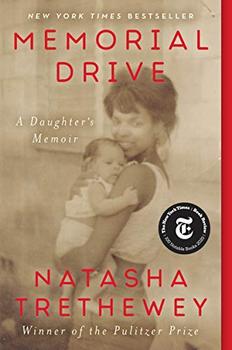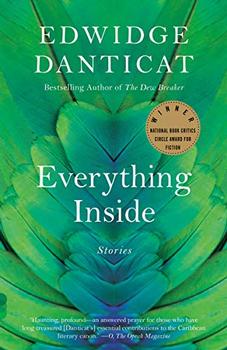Summary | Excerpt | Reading Guide | Reviews | Beyond the book | Read-Alikes | Genres & Themes | Author Bio

Edwidge Danticat dedicated her
breakout novel,
Breath, Eyes, Memory, to "the brave women
of Haiti," whom she honored by transforming her own
childhood, in which she was raised by her aunt while
her parents made a new life in New York, into a
haunting novel that ranges from the supernatural to
the political. Brother, I'm Dying takes that
same raw material, the childhood of a girl separated
from her parents for eight years, and does something
very different. This is a memoir, deeply scored with
harsh facts, and it is about the beloved men in her
life.
On the same day that she learns she is pregnant,
Danticat learns that her father, Mira, is dying of
pulmonary fibrosis. He lives long enough to hold her
daughter, but he also lives long enough to
experience the death of his brother Joseph, the
uncle who also raised Danticat in Haiti. From these
emotionally laden events, Danticat moves backward
into history, tracing the brothers' thirty-year
relationship across an ocean and her own role as a
facilitator of their words.
For Danticat, paying tribute to her father and uncle
means interviewing family members and poring over
official documents in order to give their life
stories the robustness and cohesiveness she feels
they deserve. Yet for all her loving fidelity to the
facts—the history of Haiti she deftly interweaves
into her personal story, the medical data from her
father and illnesses—this is eminently a writer's
tale. Danticat pays as much attention to how
her family tells each other their life stories as
she does to those stories themselves. As a young
girl reading her father's too-short letters from
overseas, she "used to dream of smuggling him
words." Later, he explains, "What I wanted to tell
you and your brother was too big for any piece of
paper and a small envelope." When she finally
rejoins her parents, her welcome gift is a Smith
Corona typewriter. "This will help you measure your
words," her father tells her. Danticat becomes like
her uncle who, when he loses his voice to a throat
operation and can no longer preach in the church he
founded, begins filling notebooks with observations
and facts. Throughout the book, Danticat underscores
her family's entanglement with Haitian politics and
history by paralleling their lives to the characters
in her Granmé Melina's folktales.
Brother, I'm Dying unfolds in a deliberately
reserved, unornamented voice as the narrator
subsumes herself into the story of her revered
elders. Because of this, the passages about
Danticat's own childhood never fully snap into focus
and she can only gesture toward her feeling of
abandonment when her parents move to the U.S. For at
least one reviewer, this self-effacement compromises
Danticat's honesty with the reader, especially since
she was writing acclaimed novels and winning
literary renown as the book's events unfolded. In
this reviewer's opinion, her pared-down style
devastatingly conveys, without overt editorializing,
the injustice and inhumanity of her uncle's
treatment in the hands of Homeland Security
officials, and it delivers her grief at both men's
deaths in raw form, without sentimentality. "I am
writing this only because they can't," she states.
Brother, I'm Dying may be about Mira and
Joseph Danticat, but it also serves as a portrait of
a daughter and niece's fierce loyalty as she carves
the lives of her loved ones in granite prose.
Interesting Links:
![]() This review was originally published in The BookBrowse Review in October 2007, and has been updated for the
September 2008 edition.
Click here to go to this issue.
This review was originally published in The BookBrowse Review in October 2007, and has been updated for the
September 2008 edition.
Click here to go to this issue.

If you liked Brother, I'm Dying, try these:

by Natasha Trethewey
Published 2021
A chillingly personal and exquisitely wrought memoir of a daughter reckoning with the brutal murder of her mother at the hands of her former stepfather, and the moving, intimate story of a poet coming into her own in the wake of a tragedy.

by Edwidge Danticat
Published 2020
From the internationally acclaimed, best-selling author of Brother, I'm Dying, a collection of vividly imagined stories about community, family, and love.
We must believe in luck. For how else can we explain the success of those we don't like?
Click Here to find out who said this, as well as discovering other famous literary quotes!
Your guide toexceptional books
BookBrowse seeks out and recommends the best in contemporary fiction and nonfiction—books that not only engage and entertain but also deepen our understanding of ourselves and the world around us.